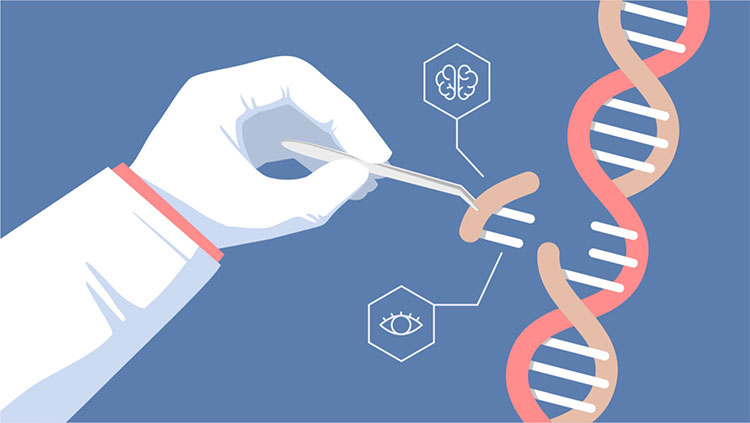The unpredictable harm from Chinese scientists' genetic modification experiment
In recent days, information about Chinese scientist Xia Jianhui (He Jiankui) uses CRISPR / Cas9 technology to separate unwanted genes from human embryos, creating the first genetically modified humans. shocked the global scientific community. Editing human genes can cause consequences that we cannot anticipate.
Chinese scientist Xia Kien Khue said in a video he posted on YouTube on November 25 that he used the CRISPR / Cas9 technique - a gene editing tool that revolutionized the field of genetics in the decade. to erase a gene in human embryos (gene CCR5) that helps babies born to be immune to HIV. He said in the video that the genetically modified twins were born 'as healthy as any other child' and named Lulu and Nana.
However, Khue's statement about his experiment has not yet been verified. Even the hospital that Khue was licensed to experiment with also denied his involvement.
The scientific community reacted to Khue's announcement with indignation and concern. Indeed, without considering the moral aspect of human gene interference, the creation of changes to human genes could lead to unforeseen health risks.

The genes do not exist separately.They continually interact with other genes, creating an effect on the internal organs.
'It is true that the revision Mr. Xia Jianue created for the embryo will prevent HIV infection. However, the problem is that the deleted CCR5 gene has many other functions, not just the door to HIV infection , 'said Mazhar Adli, a geneticist at Virginia Medical University.
The CCR5 gene also plays a role in preventing West Nile virus, so separating it from the genome can make a person more susceptible to disease. That was Mr. Feng Zhang's opinion, a scientist working for the Broad Institute. Mr. Zang is one of the pioneering scientists in using CRISPR gene editing technology.
Moreover, genes do not exist separately. They continually interact with other genes, creating an effect on the internal organs.'Deleting a single gene not only changes the way other genes work, but also changes the overall behavior of the cell and the phenotype of the organism,' Adli said. (A phenotype is an observable trait, such as the brown eye color a person can get from a gene).
In July, scientists published a report in the journal Nature Biotechnology that using CRISPR / Cas9 technology could produce immeasurable consequences by accidentally changing DNA sequences.
"We have to use this technique very carefully, because it involves many problems ," said Dr. Avner Hershlag, director of Northwell Health Fertility Hospital in Manhasset, New York. Approaching and eliminating a gene can cause unwanted effects elsewhere in the genome. In other words, the Cas9 protein that scientists want to remove from a position can move to another location in the genome, Hershlag told Live Science.
But scientists are difficult to recognize these implicit changes. They will not be clear until the baby is born and may even be revealed years later.
'Changes often manifest late, and these genetic changes can be passed down to future generations , ' Hershlag said.
There is also a risk called mosaicism . Usually, the cells in the body carry the same genome, but the mosaic is the case in which some cells, not all, carry a genetic change due to genetic modification, Hershlag said. This is a factor that can lead to illness, he added.
Both Adli and Hershlag point out the fact that, when it comes to preventing HIV, there are safer and easier ways to do it. For example, PrEP treatment (patients taking daily medication) has been shown to be successful in preventing HIV infection in trials. And other treatments are also being studied and very promising.
"Who will be responsible for the genetic modification of the children in the future when other children are treated with a simple pill and live happily, and the gene editors are going through all the effects yet? defined? " , Mr. Adli asked questions.
- For the first time in embryonic genetic modification history
- The monkey has a mother and a father
- Controversy about technology to create perfect babies
- China is about to test genetic modification on humans
- Use genetic modification tools to create super-muscular dogs
- Incest has happened 'like a meal' in ancient times?
- Believe it: Science creates bees from
- The world's first genetically modified twin girls, able to fight HIV infection
- Scientists have figured out how to change the genome in humans
- First successful in testing gene editing technology
- 5 Russian couples have agreed to use genetic modification so their children are not deaf?
- Detection of genetic modification factors for breast cancer
 13 causes of non-itchy rash
13 causes of non-itchy rash How the mouse with human ears changed the world?
How the mouse with human ears changed the world? The truth about 'fried rice syndrome!
The truth about 'fried rice syndrome! What is dental implant?
What is dental implant?